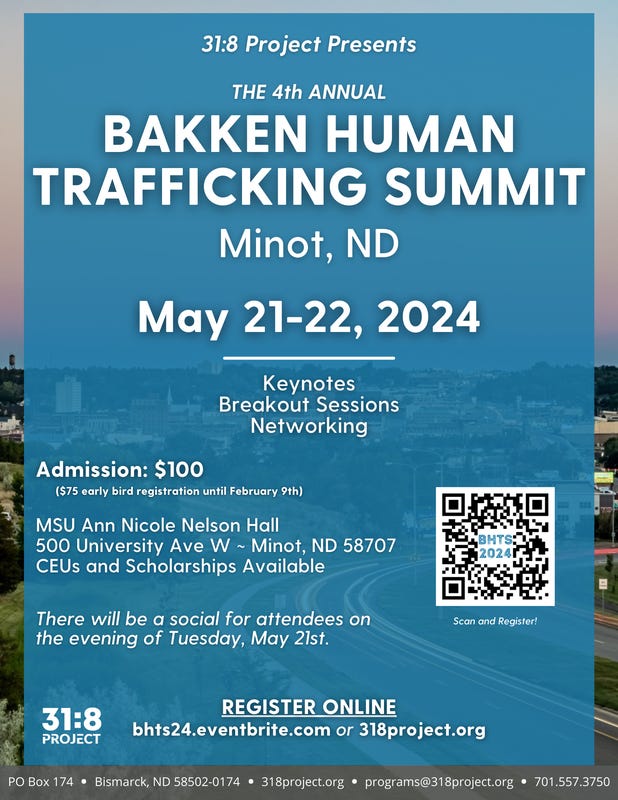Human trafficking remains a pervasive and deeply troubling issue that plagues societies worldwide. Despite concerted efforts to combat it, numerous challenges persist, hindering progress towards its eradication.
Stacy Schaffer, Founder and Executive Director of 31:8 Project, discusses the realities behind human trafficking, pornography, identifying signals and what are some resources people can use for help.
”Men, women, and children are sold into a $150 billion annual market for sex and labor. This is happening globally, nationally and locally; in hotels, restaurants, and on street corners,” Schaffer said. “Slavery is wrapped up in almost every industry’s supply chain, tainting the food we eat, the clothes we buy, and the electronics we love.”
Schaffer added that human trafficking is a form of modern-day slavery and involves the movement of people by means of violence, deception or coercion for the purpose of forced labor, servitude, or slavery-like practices.
“It is a market-based economy that exists on principles of supply and demand,” Schaffer said. “It thrives due to conditions, which allow for high profits to be generated at low risk.”
Here, are some of the key hurdles faced by society in addressing the complex issue of human trafficking.
Misunderstanding and Awareness: Human trafficking is often misunderstood, leading to misconceptions about its prevalence and nature. Raising awareness and fostering a deeper understanding of the multifaceted aspects of human trafficking is crucial in combating this crime.
Victim Identification and Support: Identifying and assisting victims of human trafficking pose significant challenges. Victims may fear seeking help due to threats, coercion, or mistrust of authorities. Additionally, there is a lack of adequate resources and support systems for survivors, making their recovery and reintegration into society challenging.
Legal and Prosecution Challenges: Prosecuting traffickers requires navigating legal complexities and jurisdictional issues. Furthermore, many victims face obstacles in accessing justice, with some preferring healing and prevention over confrontation.
Public Health Perspective: Recognizing human trafficking as a public health issue is imperative. Addressing the physical and mental health needs of survivors, as well as implementing preventive measures, is crucial in combatting this crime.
Global Collaboration and Coordination: Human trafficking is a transnational crime that requires coordinated efforts at local, national, and international levels]. Collaboration among governments, law enforcement agencies, NGOs, and communities is essential for effective prevention, prosecution, and protection of victims.
“I experienced my first case of human trafficking with a little girl named Anna. She was eight years old at the time,” Schaffer recalled. “And we don't typically see this in North Dakota the way it was portrayed in Guatemala, but she was taken from a playground and brought to a brothel where she was repeatedly sexually abused over and over again.”
Schaffer continued to share her story.
“Now, regardless of who you are or your ages, that's going to be a traumatic event because it was for Anna, and we were fortunately able to intervene, which is very uncommon in underdeveloped areas,” Schaffer said. “So we were able to provide her with services, and she went on to live a pretty stable life. She ended up getting married, having kids, and is doing well. So she's really my motivation and inspiration for launching 31:8 Project in 2015.”
Schaffer reminds people that combatting human trafficking demands a multifaceted approach and collective action from all sectors of society. By addressing these challenges head-on and fostering collaboration, we can strive towards a world free from the horrors of human trafficking.
“You never know what can trigger you,” Schaffer said. “So our goal is to set them up with the skills so when they are triggered that they don't go back to something that's dangerous or relapse in some capacity, but instead they have the tools to keep moving forward.”
If you have an ESG-related news tip, press release, fabulous feature, podcast guest suggestion or other content concepts, please email thecontentcreationstudios(AT)gmail(DOT)com
All Energy Has A Purpose and We Are All Energy. Support those who are living the crude life today!
#thecrudelife promotes a culture of inclusion and respect through interviews, content creation, live events and partnerships that educate, enrich, and empower people to create a positive social environment for all, regardless of age, race, religion, sexual orientation, or physical or intellectual ability.



















Human Trafficking, Pornography Issues Increase in the Bakken